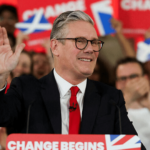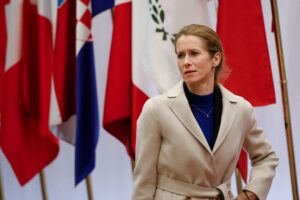US president’s heritage is a form of soft power as he travels to Belfast and Republic of Ireland to mark Good Friday agreemen.
It was a line guaranteed to raise a smile. “As we know, every American president is a little bit Irish on St Patrick’s Day,” Leo Varadkar, the Irish taoiseach, observed during last month’s celebration at the White House. “But some are more Irish than others.”
Joe Biden is as Irish as it gets. On Tuesday he travels to Belfast, Northern Ireland, to celebrate the 25th anniversary of the peace accord that helped end decades of deadly sectarian violence, then on to the Republic of Ireland for stops including Dublin, County Louth and County Mayo for what will feel almost like a homecoming.
The visit will underscore Biden’s status as “unmistakably a son of Ireland”, as Varadkar described him at last month’s celebration in Washington. The oldest US president is sure speak of his Irish heritage, quote Irish poetry and embrace Ireland as a fundamental part of his personal and political identity.
Biden’s spiritual attachment to Ireland has been a constant all his life. He introduces himself as the great-great-grandson of the Blewitts of County Mayo and the Finnegans of County Louth, “who boarded coffin ships to cross the Atlantic more than 165 years ago”. He expresses deep pride in his Irish ancestry, recently commenting: “As long as I can remember, it’s been sort of part of my soul.”
Sometimes, however, it comes out wrong. The gaffe-prone president said last year: “I may be Irish but I’m not stupid.”
Biden can also trace his family tree to Britain, specifically Westbourne in West Sussex and Portsmouth in Hampshire. Yet in his public persona, Britain has become a convenient foil. When, after his election victory in November 2020, a BBC journalist asked if he had “a quick word” for the British public broadcaster, Biden shot back: “The BBC? I’m Irish!”
Less flippantly, Biden tends to cite the example of British rule in Ireland as a template to express empathy with persecuted minorities. Speaking in Jerusalem last year, he said: “My background and the background of my family is Irish American, and we have a long history of – not fundamentally unlike the Palestinian people with Great Britain and their attitude toward Irish-Catholics over the years, for 400 years.”
In contrast to the high emotion of the Ireland visit, the White House has announced that Biden will not attend the coronation of King Charles III next month, although the first lady, Jill Biden, will represent the US.
Ireland, by contrast, appears to resonate with Biden through his strong sense of loyalty to both family and the Catholic church. It was also written into his childhood in Scranton, Pennsylvania.
Daniel Mulhall, a former Irish ambassador to the US, said: “I’ve been there and it’s probably the most Irish place in America. I remember meeting all the Irish organisations over breakfast one morning and there were so many of them I couldn’t count them.
“It’s a very traditional Irish-American community, proud of its roots connected with Ireland, proud of heritage, the kind of place where anybody growing up would definitely encounter that affinity with Ireland, that affection for Ireland that Joe Biden developed as a child.
Mulhall added: “He often talks about his grandfather Finnegan, who was the son of two Irish immigrants who I suppose passed on stories about the old country to the grandson. Things you hear at your grandfather’s knee tend to live with you.
“He’s very good example of that Irish-American identity, which is still strong in America despite the fact that most of the people who are Irish-American now are descended from people who came to America in the 19th century. But nonetheless, the heritage lives on.”
Biden has spoken and written often about his Irish roots. In his book, Promise Me, Dad, he states: “We Irish are the only people in the world who are actually nostalgic about the future.”
In another passage, he observes: “One of my colleagues in the Senate, Daniel Patrick Moynihan, once made this simple but profound observation about us Irish: ‘To fail to understand that life is going to knock you down is to fail to understand the Irishness of life.’”
Evan Osnos, author of a 2020 biography of Biden, said: “To Joe Biden, in effect, being of Irish descent is all about the relationship between suffering and hope. The Irishness of life has become a kind of grand metaphor for Biden over the course of his own life, beginning when he was a kid.
“The process of getting over a stutter became this fulcrum in his own self narrative and in practical terms the way that he actually got over the stutter was by memorising quotes from Yeats and [American Ralph Waldo] Emerson. That’s one of the reasons why he has this quick instinct to deploy Irish poetry.”
The president frequently deploys WB Yeats’s Easter, 1916 and has quoted Seamus Heaney’s lines – “History says, don’t hope / On this side of the grave. / But then, once in a lifetime / The longed-for tidal wave / Of justice can rise up, / And hope and history rhyme” – in at least half a dozen speeches since becoming president. He likes to quip: “They think I do it because I’m Irish. I do it because they’re the best poets.”
This soft power will be on full display next week. The White House has said Biden will visit Belfast from 11 to 12 April to mark progress since the Good Friday agreement was signed a quarter of a century ago and to show US readiness to support Northern Ireland’s economic potential.
In the 1980s Biden was among a group of senators who pushed for greater US diplomatic involvement to end the conflict in Northern Ireland. He recently praised the Windsor framework as an important step in maintaining the peace accord, remarking: “It’s a vital, vital step and that’s going to help ensure all the people in Northern Ireland have an opportunity to realise their full potential.”
Biden will then spend 12 to 14 April in the Republic of Ireland, addressing the Irish parliament and attending a festival in County Mayo. He is guaranteed an effusive welcome, although comparisons with John F Kennedy’s famous visit to Ireland in 1963, which the young president described to aides as the best four days of his life, are perhaps less interesting than the contrasts.
Brendan Boyle, a Democratic congressman from Pennsylvania and leading member of the Friends of Ireland group, who has been invited to join Biden on the trip, said: “Sixty years separate JFK’s trip in 1963 and Joe Biden’s trip next week. I don’t think any country on the planet has experienced more change in those six decades than Ireland.
“My father was 13 years old when President Kennedy came to Ireland. He was growing up in a very rural part of the country, a country that was socially conservative, that at that point was only a few decades removed from winning its independence, was still experiencing unemployment north of 20%. In terms of the media landscape, it was like 600 years ago.
“Now, Ireland today is one of the wealthiest countries on earth, a very forward looking, socially tolerant place, a country unlike most of the western world in which it’s a rather young population. This trip in many ways will celebrate President Biden’s connection with Ireland but also just how far Ireland has come in a relatively short period of time.”
Source : The Guardian











